P and Q are isomers of dicarboxylic acid C4H4O4. Both decolurize Br2/H2O. On heating, P forms the cyclic anhydride. Upon treatment with dilute alkaline KMnO4 P as well as Q could produce one or more than one from S, T and U.

Compounds formed from P and Q are, respectively
optically active S and optically active pair (T, U)
optically inactive S and optically inactive pair (T, U)
optically active pair (T, U) and optically active S
optically inactive pair (T, U) and optically inactive S.
The correct Answer is:B
Topper's Solved these Questions
- ALDEHYDES ,KETONES AND CARBOXYLIC ACIDSBOOK - MODERN PUBLICATIONCHAPTER - ALDEHYDES ,KETONES AND CARBOXYLIC ACIDSEXERCISE - COMPETITION FILE ( OBJECTIVE TYPE QUESTIONS - MULTIPLE CHOICE QUESTIONS (MCQ) ( INTEGER TYPE QUESTIONS )
9 Videos
- ALDEHYDES ,KETONES AND CARBOXYLIC ACIDSBOOK - MODERN PUBLICATIONCHAPTER - ALDEHYDES ,KETONES AND CARBOXYLIC ACIDSEXERCISE - UNIT PRACTICE TEST
13 Videos
- ALDEHYDES ,KETONES AND CARBOXYLIC ACIDSBOOK - MODERN PUBLICATIONCHAPTER - ALDEHYDES ,KETONES AND CARBOXYLIC ACIDSEXERCISE - COMPETITION FILE ( OBJECTIVE TYPE QUESTIONS - MULTIPLE CHOICE QUESTIONS (MCQ) ( C. MULTIPLE CHOICE QUESTIONS )
10 Videos
- ALCOHOLS, PHENOLS AND ETHERSBOOK - MODERN PUBLICATIONCHAPTER - ALCOHOLS, PHENOLS AND ETHERSEXERCISE - UNIT PRACTICE TEST (FOR BOARD EXAMINATION)
12 Videos
- BIOMOLECULESBOOK - MODERN PUBLICATIONCHAPTER - BIOMOLECULESEXERCISE - UNIT PRACTICE TEST FOR BOARD EXAMINATION
13 Videos
Similar Questions
P and Q are isomers of dicarboxylic acid C4H4O4. Both decolorize Br2/H2O. On heating, P forms the cyclic anydride.
Upon treatment with dilute alkaline KMnO4, p as well as Q could produce one or more than one from the S,T and U
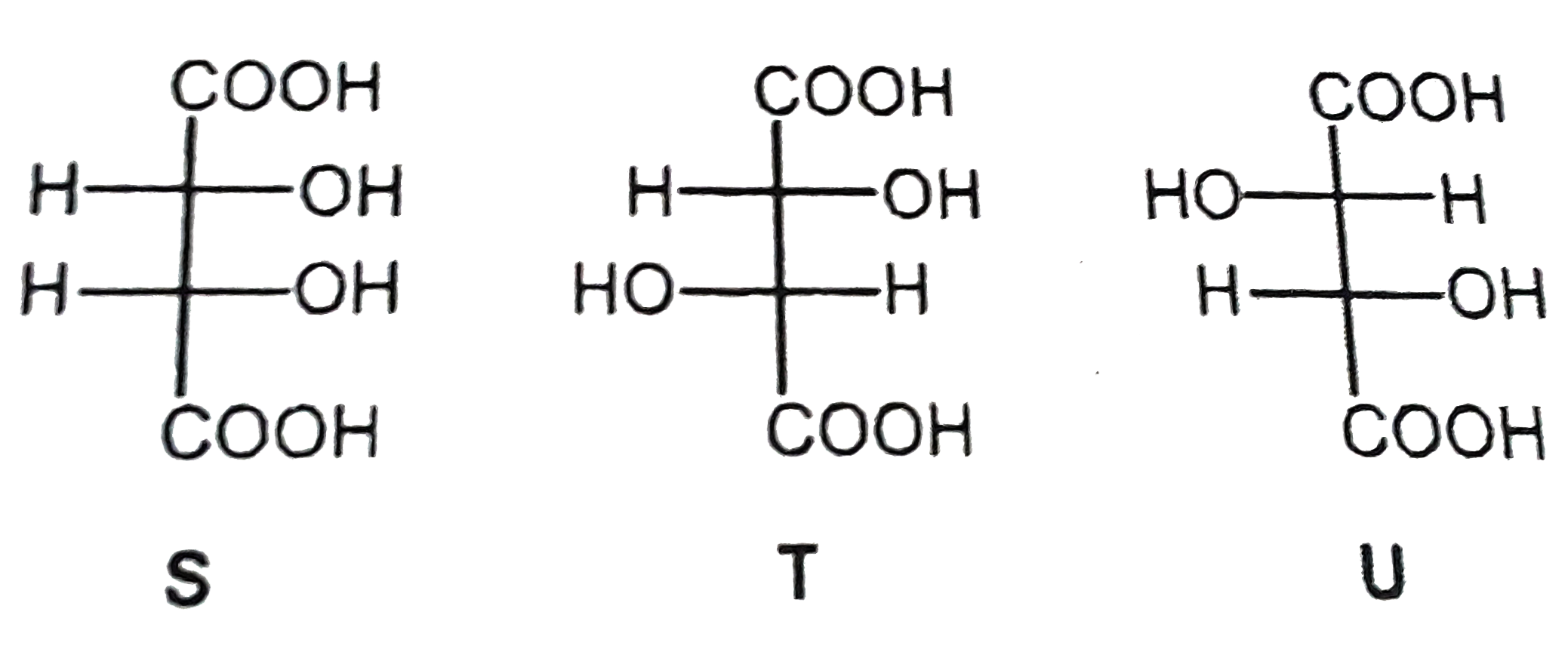
Compounds formed from P and Q are, respectively:
View Solution[P] on treatment with Br2/FeBr3 in CCl4 produced a single isomer C8H7O2Br while heating [P] with sodalime gave toluene The compound [P] is
View Solution
Knowledge Check
P and Q are isomers of dicarboxyhc acid C4H4O4 .Both decolourize Br2/H2O On heating, P forms the cyclic anhydride.
Upon treatment with dilute alkaline KMnO4, P ass well as Q could produce one or more than one from S. T and U.

Compounds formed form P and Q are, respectively.AOptically active s and optically active pair (T,U)BOptically active S and optically inactive pair (T,U)COptcally actve pair (T. U) and optically active SDOptically inactive pair (T. U) and optically inactive SP and Q are isomers of dicarboxylic acid C4H4O4. Bothdecolorize Br2/H2O. On heating, P forms the cyclic anhydride. Upon treatment with dilute alkaline KMnO4,P as well as Q could produce one or more than one forms S,T and U.
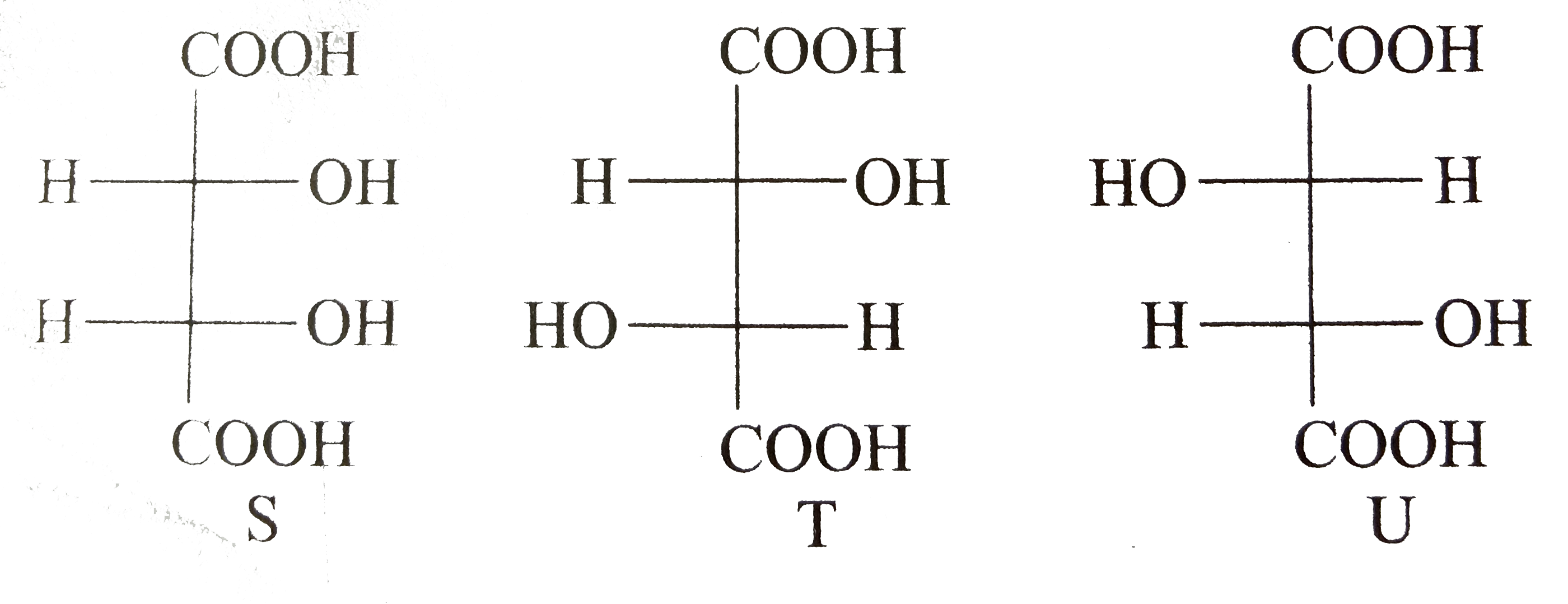 Compounds formed from P and Q are, respectivelyAoptically inactive pair (T,U) and optically inactive SBoptically active pair (T,U) and optically active SCoptically inactive S and optically inactive pair (T,U)Doptically active S and optically inactive pair (T,U)
Compounds formed from P and Q are, respectivelyAoptically inactive pair (T,U) and optically inactive SBoptically active pair (T,U) and optically active SCoptically inactive S and optically inactive pair (T,U)Doptically active S and optically inactive pair (T,U)P and Q are isomers of dicarboxylic acid C4H4O4. Both decolorize Br2/H2O. On heating, P forms the cyclic anydride.
Upon treatment with dilute alkaline KMnO4, p as well as Q could produce one or more than one from the S,T and U

Compounds formed from P and Q are, respectively:AOptically active S and optically active pair (T,U)Boptically inactive S and optically inactive pair (T,U)COptically active pair (T,U) and optically active SDOptically inactive pair (T,U) and optically inactive S
P and Q are isomer of dicraboxylic acid C4H4O4 Both decolourixe Br2/H2O. On heating , P forms the cyclic anhydride. Upon treatment with duilute alkaline KMnO4. P as well a Q could produce one or more than one from S,T and U.
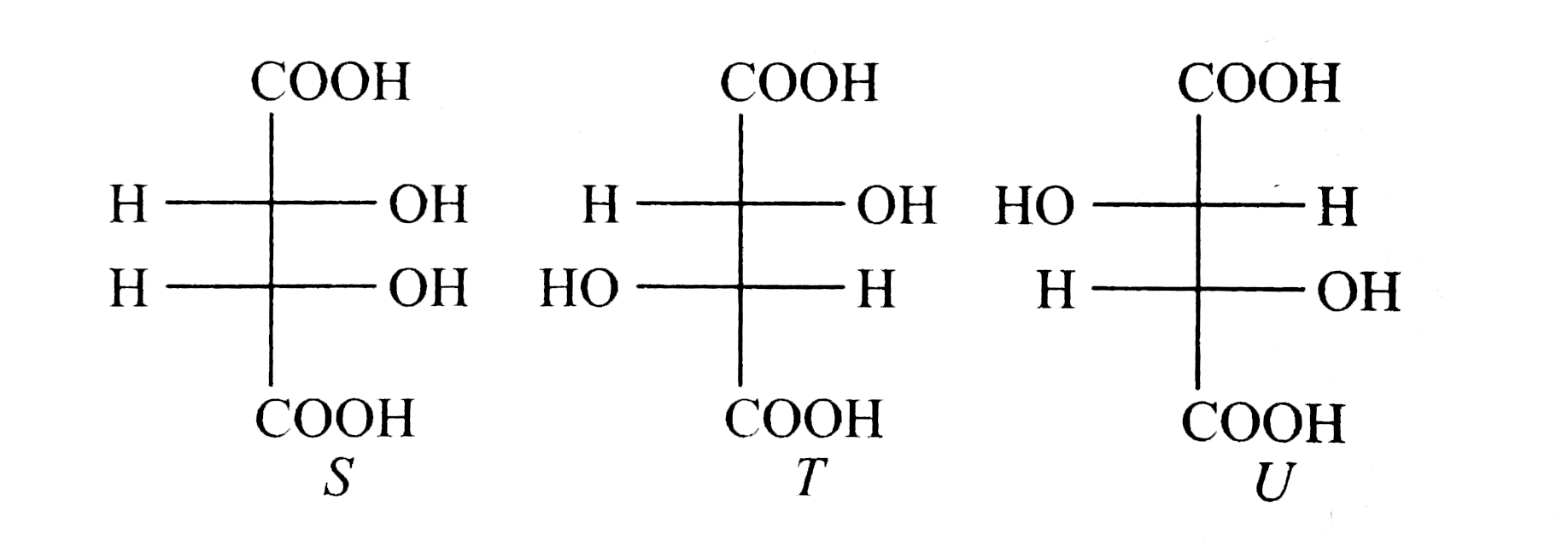
Compounds formed P and Q are, respectively
View SolutionP and Q are isomers of dicarboxylic acid C4H4O4. Both decolorize Br2/H2O. On heating, P forms the cyclic anydride.
Upon treatment with dilute alkaline KMnO4, p as well as Q could produce one or more than one from the S,T and U
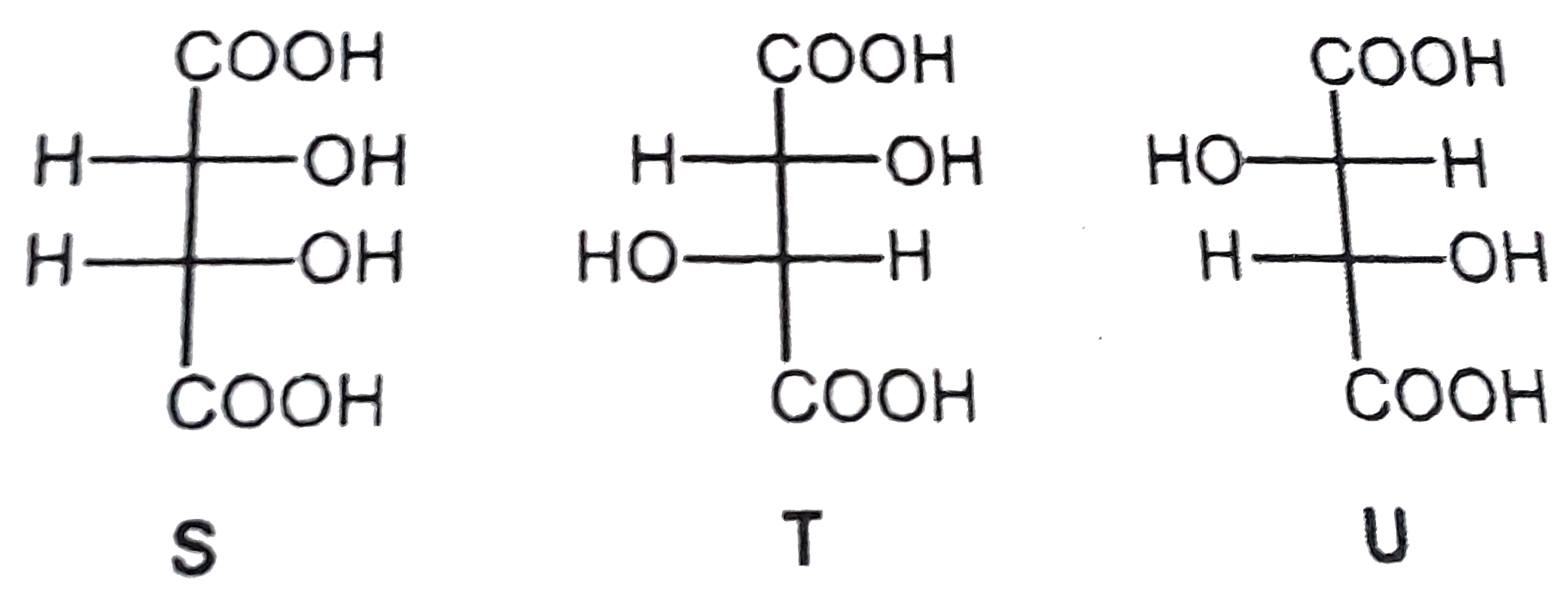
In the following reaction, sequences V and W are respectively.

View SolutionP and Q are isomer of dicraboxylic acid C4H4O4 Both decolourixe Br2/H2O. On heating , P forms the cyclic anhydride. Upon treatment with duilute alkaline KMnO4. P as well a Q could produce one or more than one from S,T and U.
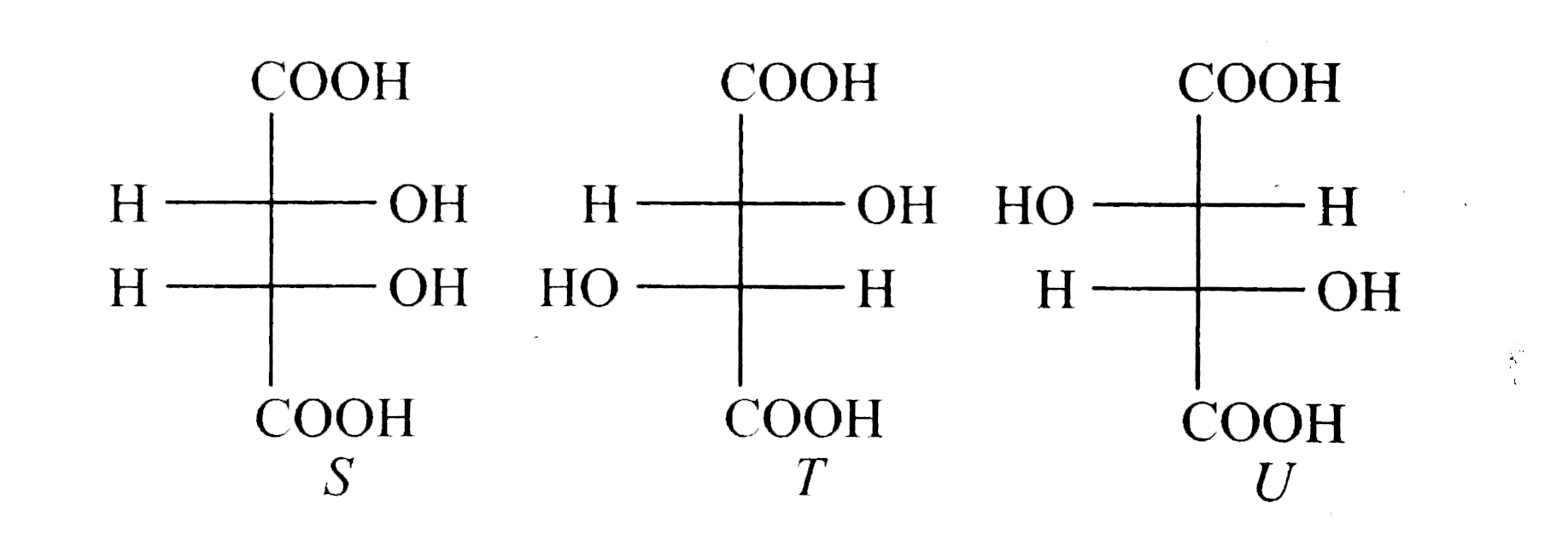
In the following reaction sequences V and W are respectively
QH2/Ni−−−→ΔV

View Solution[P] on treatment with H2CrO4 in acetone produced [Q]. [Q] compound upon heating give rise to Acetophenone. The compound [P] is:
View SolutionThe oxidation states of P in H4P2O5,H4P2O6 and H2P2O7 are respectively
View Solution

